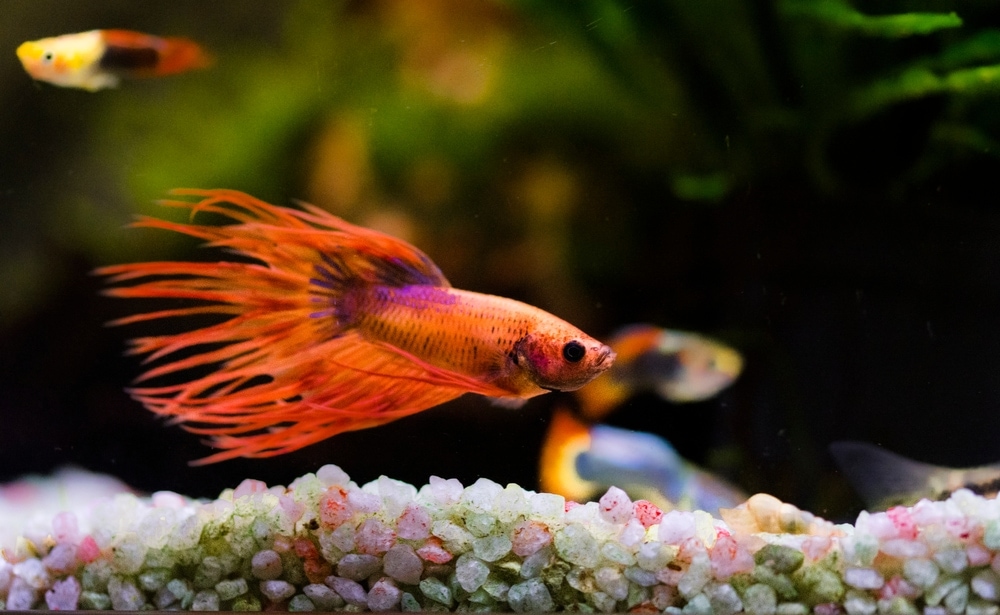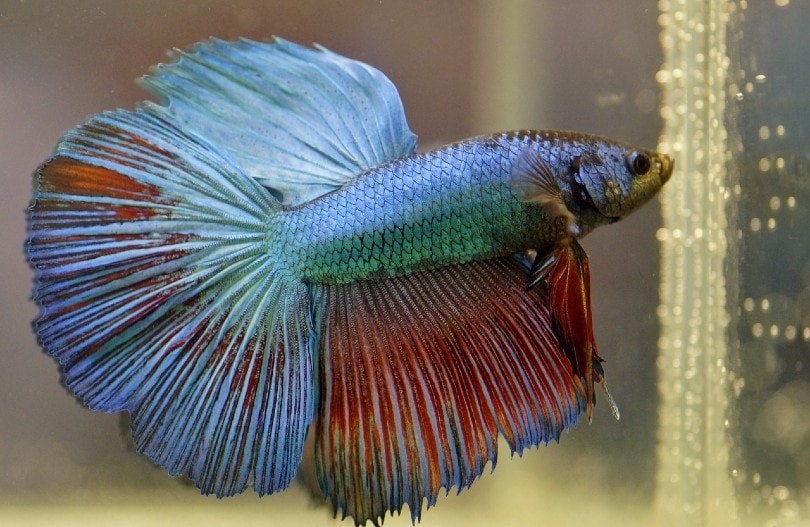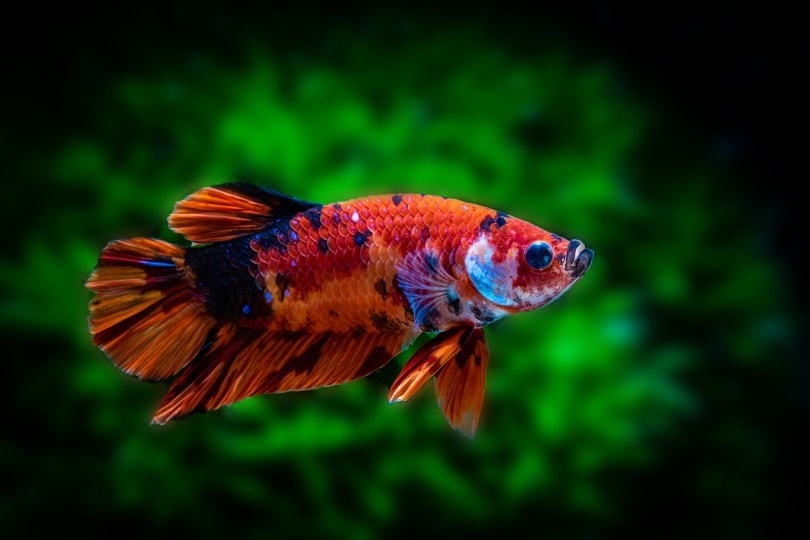Can Angelfish & Betta Fish Live Together? Our Vet Explains
By Dr. Luqman Javed, DVM (Vet)
Updated on

For many betta enthusiasts, watching their favorite fish being housed alone can be puzzling. Although these fish (particularly the males) are labeled as territorial, many people show them successfully housed with other fish in community setups. So, what gives?
Interestingly, bettas can sometimes be housed in a community setup, depending on their individual personalities and the compatibility of the other fish. Angelfish are popular fish due to their appearance. They are extremely thin when viewed straight on but are quite wide when viewed from the side! Their name often leads people to believe that they will be a peaceful, “angelic” addition to a community aquarium.
Unfortunately, angelfish and bettas should not be housed together on a long-term basis, because angelfish tend to get aggressive as they get older. This makes them a poor candidate for being housed with bettas.
Betta Fish and Communities
Male Bettas are instinctively territorial and aggressive toward their conspecifics. Interestingly, those bred in captivity as pets are generally more aggressive than their wild counterparts, as they were likely bred with aggression as a desired trait.
However, bettas are also bred for having fancy fins and flowing tails, and they are naturally accustomed to slow-moving bodies of water, making them weak swimmers. Therefore, although they may be aggressive toward other bettas, they are usually not much of a threat when confronted with other species of popular pet fish. They are slow swimmers with long fins and tails for would-be bullies to nip at.
So, when you’re considering a community setup for a betta, care should be given to ensure that the other fish won’t be threats to the betta and that they won’t be misconstrued as rivals.
The checklist for potential betta tank mates is as follows. Please note that all these criteria should be met before attempting to house bettas in a community setups.
- Not another betta
- Tropical fish that prefer similar temperatures, pH, and water parameters
- No long flowing fins that your betta may mistake as those of a rival
- Peaceful and not aggressive or territorial
- Not top dwellers
- Large enough aquarium to accommodate all the fish while meeting the needs of every species
- Other fish in the aquarium not being too large in size compared to your betta
The following factors may also be considered to increase the chances of a successful community setup:
- It is best to add the betta as the last fish to the aquarium. This way, the betta may view the tank mates as fish that already exist in a brand-new territory.
- Aggressiveness is partly inherited in betta fish, so try to get a betta that has been housed with other fish before and is somewhat docile. Bettas that are overly aggressive should be housed alone, as they may not be good candidates for a community setup.
Female bettas require the same checklist, with one exception: They should either be the only betta in an aquarium, or they should be housed in a sorority of at least five or more females of the same size and age, all added to the aquarium at the same time.
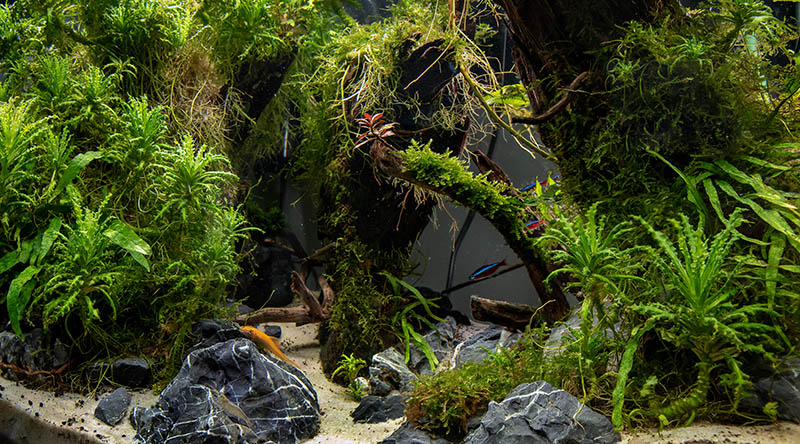
Why You Shouldn’t Keep Betta Fish and Angelfish Together
Angelfish are not considered good tank mates for bettas on a long-term basis for several reasons. They are cichlids, and like many cichlids, they are relatively peaceful while young (usually when they’re purchased) but tend to get more aggressive and territorial when they’re older. This makes them a long-term risk for bettas.
Another risk for bettas (and other tank mates) is the instinctive feeding pattern of angelfish. Despite their name, they aren’t ideal tank mates for many small fish. In nature, they are ambush predators. This means they lay in wait for a fish to wander close to their space and then quickly attack their victim. This instinct is also hard-wired in pet angelfish. A slow-swimming betta is a naturally curious fish that may wander too close to an angelfish and end up regretting it. Although your betta might be too large to become a meal, an angelfish may still take a few chunks out of their fins, predisposing them to conditions like fin rot.
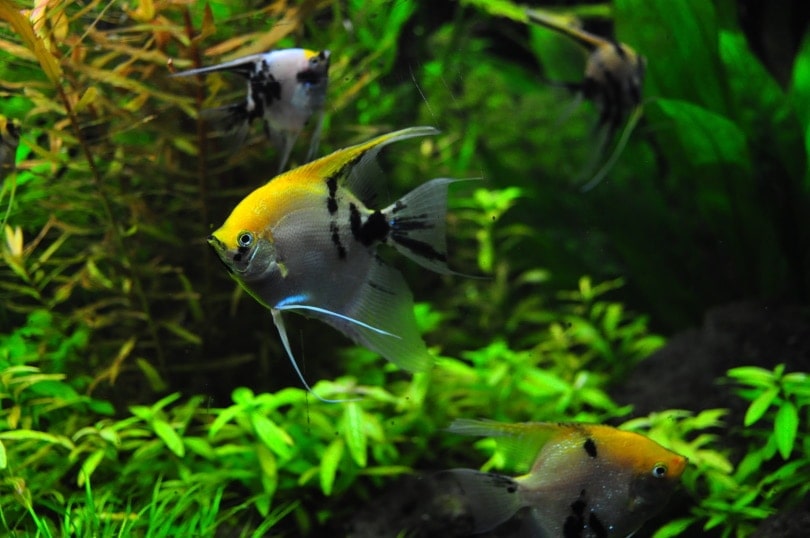
The problem might not be apparent to an inexperienced fish keeper right away. When they’re young, angelfish can be bullied by bettas. A curious or otherwise territorial betta may view a young angelfish as a threat. They may be drawn to their long, extended dorsal and anal fins and confuse the angelfish for a rival. This confrontation can go terribly wrong for one or both of them. Young angelfish, though timid, are not opposed to fighting back, especially if they feel threatened or cornered.
The aggression risk of angelfish is higher as they mature and try to claim a territory for the purposes of reproduction. Like most cichlids, angelfish care for their eggs and young. When they feel like spawning, they will claim a territory as their own and become quite aggressive to any fish that they think would pose a threat to their eggs or young. In an aquarium, this essentially means they no longer appreciate any of their tank mates. The safest tank mates for angelfish are fish that possess armored backs, such as armored catfish or talking catfish.
Do Angelfish and Betta Fish Live on the Same Tank Level?
Both of these fish prefer the middle to upper reaches of the tank, though angelfish will venture lower than bettas in many cases. This is another reason that they don’t make good tank mates. They will get in each other’s way often, and their territorial natures mean that they will often see each other as threats. It is also fairly difficult to provide plenty of cover at the top of the tank.
Better Tank Mates for a Betta
While angelfish aren’t good tank mates for your betta, other species may be more suitable for cohabitation.
- Kuhli loaches
- Harlequin rasboras
- Rummynose rasboras
- Rummynose tetras
- Emperor tetras
- Otocinclus catfish
- Ember tetras
- Apple snails
- African dwarf frogs
Be sure to thoroughly research each species before setting up a community tank with your betta. Remember that while these listed species are generally compatible with bettas, they may have unique needs that you should be mindful of before deciding to adopt them.
Other Species to Avoid
Angelfish aren’t the only fish that you should not place with a betta.
- Any cichlid (oscars, African cichlids, convicts, etc.)
- Dwarf gouramis
- Fancy guppies
- Goldfish (any variety)
- Plecos
- Chinese algae eater
- Flying fox
- Whiptail catfish
- Red-tailed black shark
- Rainbow shark
- Endler
- Black skirt tetras
- Tiger barbs
Should You Keep Angelfish and Betta Fish Together?
Preferably not. There are certain tank mates that both of these fish can get along with, but they aren’t good for each other. For instance, betta fish do much better with peaceful bottom feeders like otocinclus catfish and schooling fish like harlequin rasboras.
The angelfish is a similar story. There are other fish that can live happily with them, but betta fish aren’t included in this category.
We do not recommend keeping these two fish together. The best-case scenario will likely be you noticing the aggression before things get too bad and removing one of the fish. In the worst-case scenario, one or both of the fish will end up perishing.
See More:




